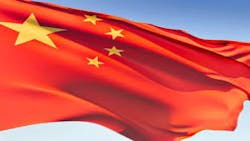China Unveils Reforms to Ease Grip on Economy
BEIJING -- China on Friday pledged ambitious reforms to loosen the Communist authorities' grip on the world's second-largest economy, as leaders chart the way forward for the next decade.
The ruling party issued a document detailing economic reforms following a key meeting, known as the Third Plenum, which ended earlier this week. The plans include requiring state firms to pay larger dividends to the government, and allowing private companies a bigger role in the economy, according to the document issued by the official Xinhua news agency.
The government will require 30% of earnings from "state capital" to be paid back to the public coffers and used for social security by 2020, it said.
China's 113 major state-owned enterprises (SOEs) directly under central government typically pay 5% to 20% of their profits to the government in dividends -- the part of a company's earnings distributed to shareholders.
"This will have an effect on facilitating a better competitive environment," ANZ Banking Group economist Liu Ligang said, adding it would make cash-rich SOEs allocate funds more rationally.
China moved to shut down or merge loss-making state firms in the late 1990s, leaving a smaller number, but with immense power over large sectors of the economy. Further reforms have been made difficult by opposition from the state sector, which has been enriched by close ties to the government and lack of competition.
In acknowledgement of private firms, China will allow private capital to take equity stakes in state-funded projects, Xinhua said, but gave no proportion.
China will also allow the set up of smaller banks and financial institutions using private funds, the document said. The country currently has just a handful of private banks.
In the financial sphere, China will push forward liberalization of its interest rates and free convertibility of its yuan currency, the document said.
"The reform plan is very ambitious," said Wang Tao, an economist for UBS in Hong Kong. "The implications for the economy and for the market depend crucially on the implementation."
China currently sets deposit rates by administrative order, but the central bank began allowing banks to decide their own lending rates in July in a long-awaited move.
Beijing has repeatedly said it would push forward convertibility of the yuan -- allowing the currency to be freely bought and sold, and with it the movement of funds into and out of China.
The government keeps a tight grip on the capital account -- investment and financial transactions, rather than those related to trade -- over worries that unpredictable inflows or outflows could harm the economy and reduce its control over it.
In an indication of looser control on capital flows, China will allow more overseas investment by companies and individuals.
Beijing has encouraged companies to make foreign acquisitions to find supplies of raw materials and secure market access.
Farmers will be granted rights to "possess, use, benefit from and transfer their contracted land, as well as the right to use their land ownership as a collateral or guarantee", Xinhua said.
At present all land in China is owned by the state, with farmers only granted the right to till the soil in their area, rather than freehold possession.
The move could enable tens of millions of farmers to cash in on the value of their land, and invest in new businesses or move to the cities, with authorities pushing urbanisation as a way to raise living standards.
The government will also expand a number of existing reforms now being carried out on a limited basis, including setting up more free trade zones, the document showed.
China opened a free trade zone in the commercial city of Shanghai in late September, pledging to liberalise not only trade but also investment.
The document hinted that a property tax, now levied in only two cities, could be expanded to more locations but gave no timetable.
High property prices are a major source of discontent among citizens, and authorities have sought for more than three years to control their rise.
Cash-strapped local governments will also be allowed to issue bonds, the document said. China currently allows just a few cities, including Shanghai, to issue municipal bonds.
Copyright Agence France-Presse, 2013
About the Author
Agence France-Presse
Copyright Agence France-Presse, 2002-2025. AFP text, photos, graphics and logos shall not be reproduced, published, broadcast, rewritten for broadcast or publication or redistributed directly or indirectly in any medium. AFP shall not be held liable for any delays, inaccuracies, errors or omissions in any AFP content, or for any actions taken in consequence.
